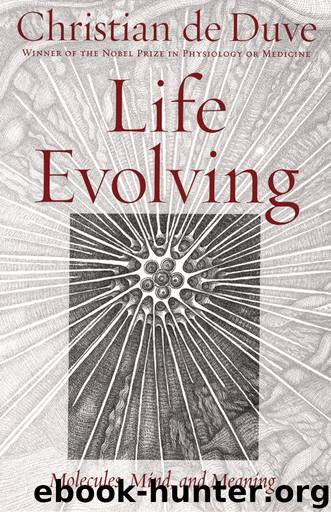Life Evolving by de Duve Christian;

Author:de Duve, Christian;
Language: eng
Format: epub
Publisher: Oxford University Press
Published: 2002-04-18T04:00:00+00:00
MUTATIONS ARE RARELY THE LIMITING FACTOR IN EVOLUTION
The number of mutations a given genome can undergo is large, but it is finite and, in many cases, not excessively large relative to the number of individuals at risk—often millions, if not billions or more—and to the time—up to millions of years—evolution has available for its experiments. Contrary to what is often assumed, evolution rarely has to wait very long for some favorable mutation to occur. More often than not, mutations are present in a population all the time or come up regularly, waiting, so to speak, for the environment to provide them with an opportunity to prove useful.
This assertion is easily demonstrated in the case of simple point mutations, that is, those in which one base is replaced by another. Considering only replication errors, which are known to occur with a frequency of about one wrongly inserted base in one billion, it is readily calculated13 that the probability of finding a given point mutation in a clone of cells produced by successive division from a single cell becomes 99.9 percent after about 34 generations, that is, less than one day for bacteria, and about one month for animal cells.14 To take a more concrete example, consider red-blood-cell renewal in the bone marrow of an adult human individual. The probability of a given point mutation taking place in the course of this process reaches 99.9 percent after only about two hours. It is fortunate that most of those mutations are harmless and that, in addition, evolution has provided elaborate repair mechanisms to offset their effects. There are, however, rare cases in which an accident of this sort may lead to some anomaly, such as cancer.
It may be argued that such calculations are of limited value because point mutations are likely to be of little importance for evolution, which probably depends mostly on more extensive genetic rearrangements whose probability is much more difficult to evaluate. It is therefore significant that all we know of evolution in action tends to confirm the richness of the mutational field.
Take, for example, the many cases of drug resistance. In only a few decades, the appearance of “superbugs” resistant to penicillin and most other antibiotics has grown into a worldwide health problem. One could argue that bacteria, with their huge numbers and fast multiplication rates, make a special case. But the problem is not limited to prokaryotes. The malarial parasite, Plasmodium falciparum, which is a eukaryotic protist, has become largely resistant to chloroquine, the drug that was produced during the last war as a substitute for the no-longer-available quinine, and it is now rapidly developing resistance against mefloquine, the latest antimalarial created in the 1960s by the U.S. Walter Reed Army Research Institute. Even more impressive, in 1948, the Nobel prize in medicine was awarded to the Swiss chemist Paul Müller “for his discovery of the high efficiency of DDT as a contact poison against several arthropods.” Malaria, it was triumphantly announced, was going to be vanquished by the simple means of killing off the mosquitoes that transmit the parasite.
Download
This site does not store any files on its server. We only index and link to content provided by other sites. Please contact the content providers to delete copyright contents if any and email us, we'll remove relevant links or contents immediately.
Enlightenment Now: The Case for Reason, Science, Humanism, and Progress by Steven Pinker(6871)
A Journey Through Charms and Defence Against the Dark Arts (Harry Potter: A Journey Through…) by Pottermore Publishing(4725)
The Immortal Life of Henrietta Lacks by Rebecca Skloot(4255)
A Journey Through Divination and Astronomy by Publishing Pottermore(4249)
Elon Musk by Ashlee Vance(3854)
Origin Story: A Big History of Everything by David Christian(3472)
COSMOS by Carl Sagan(3346)
Alchemy and Alchemists by C. J. S. Thompson(3294)
Enlightenment Now by Steven Pinker(3271)
Shadow of Night by Deborah Harkness(3173)
Inferior by Angela Saini(3150)
A Mind For Numbers: How to Excel at Math and Science (Even If You Flunked Algebra) by Barbara Oakley(3103)
Bad Pharma by Ben Goldacre(3095)
Origin Story by David Christian(2991)
Signature in the Cell: DNA and the Evidence for Intelligent Design by Stephen C. Meyer(2875)
The Code Book by Simon Singh(2856)
The Elements by Theodore Gray(2851)
A Brief History of Time by Stephen Hawking(2819)
A Journey Through Potions and Herbology (A Journey Through…) by Pottermore Publishing(2772)
